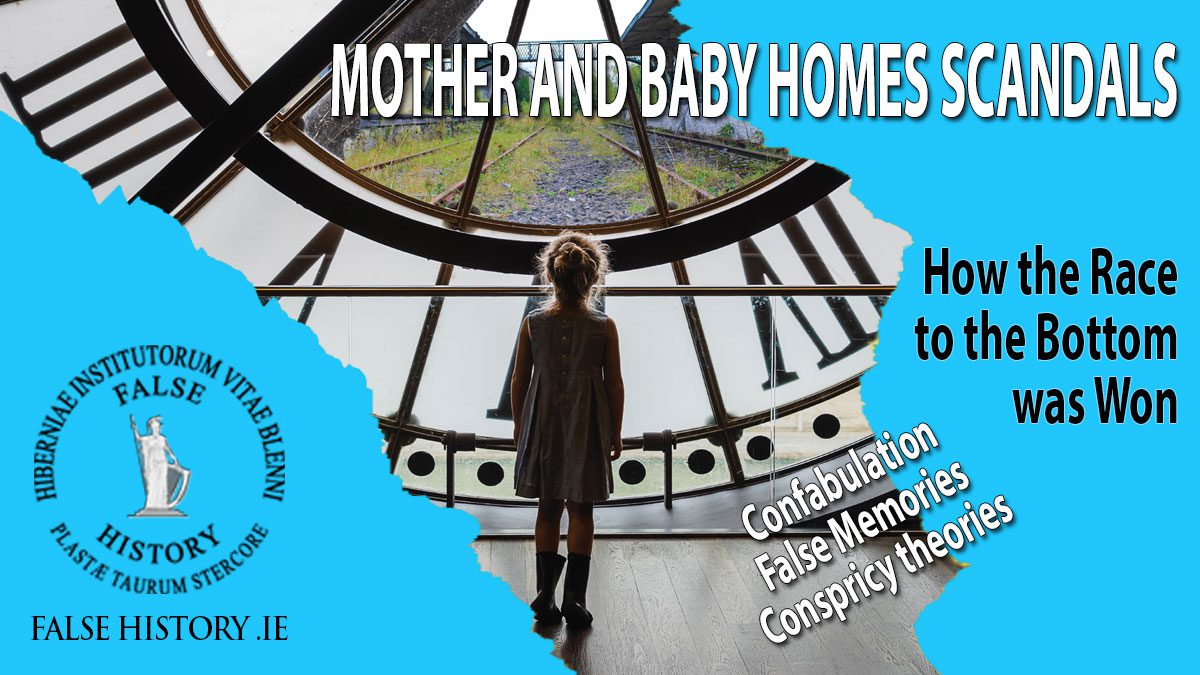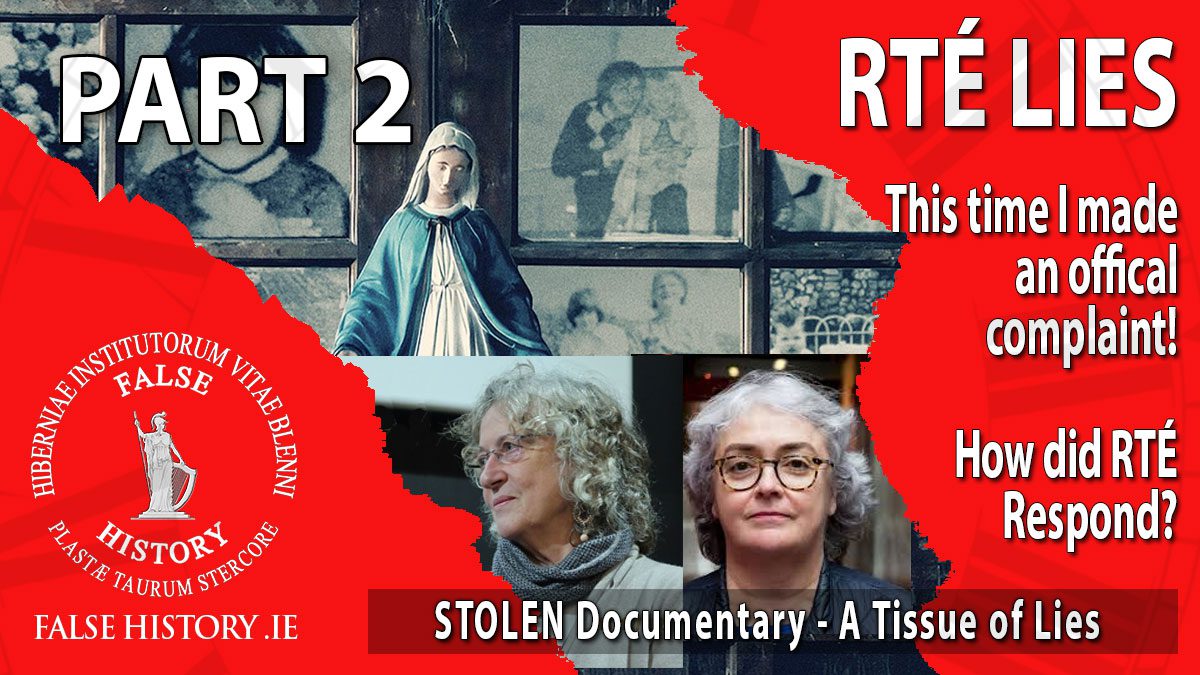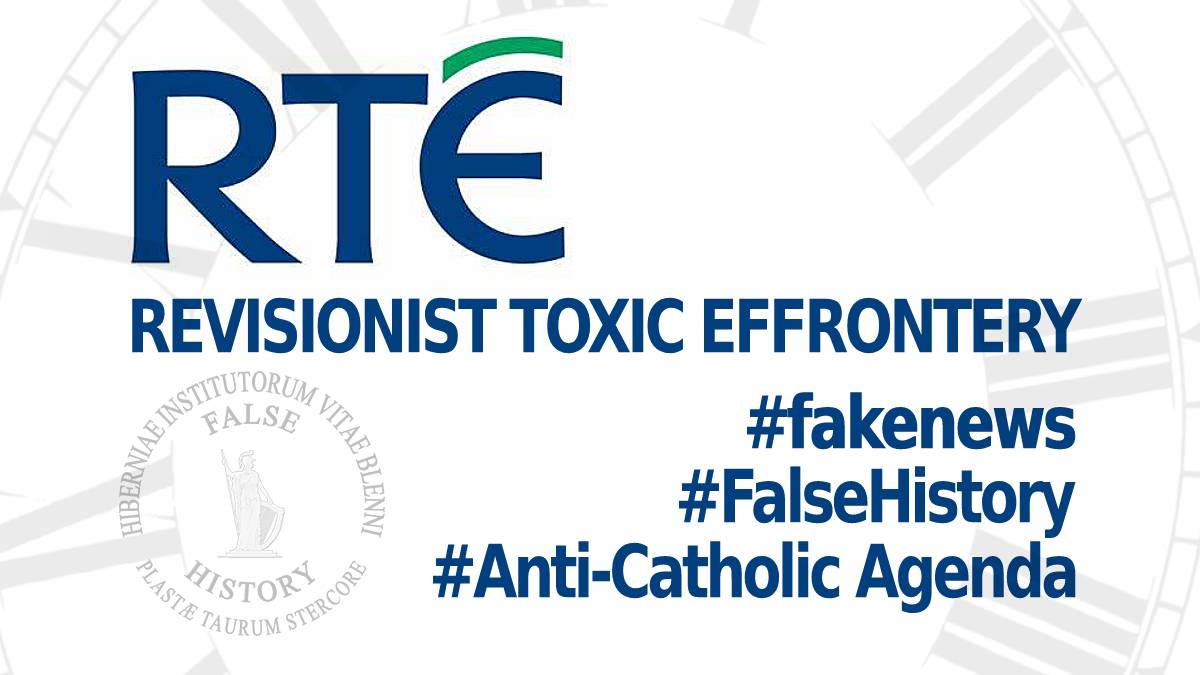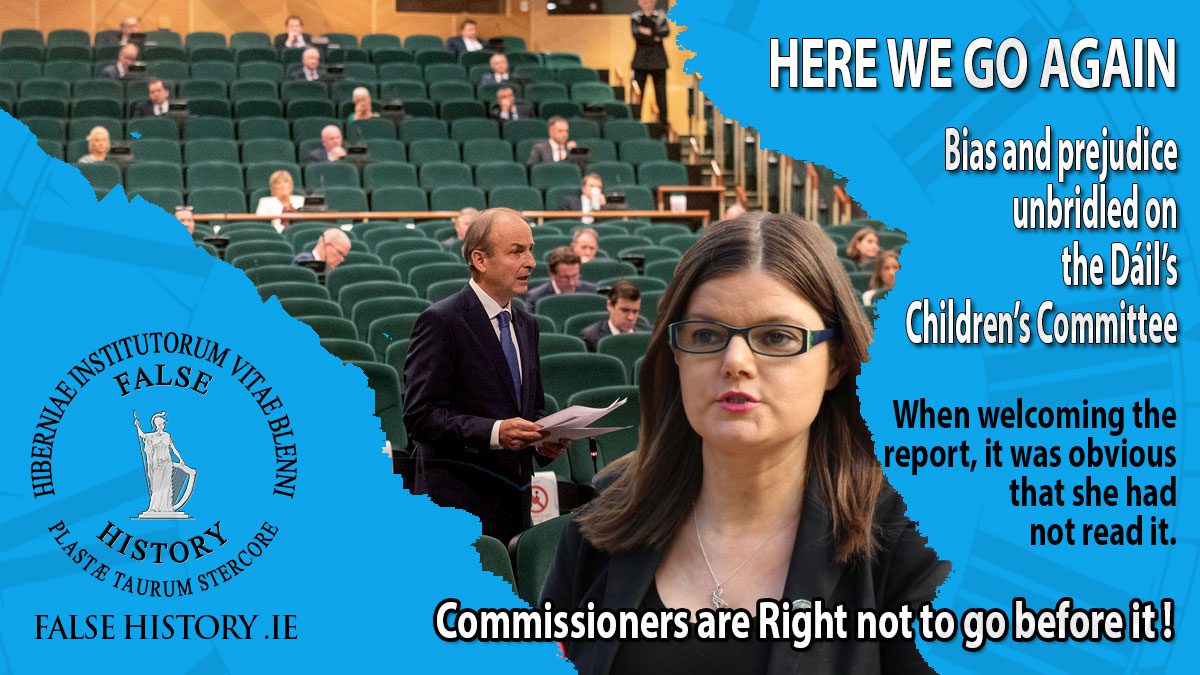A violation of law is one thing but accusing people of violating laws which don’t exist or did not exist in the past, is considered to be such an abuse of power that the constitution of many countries, including Ireland, prevents their governments from enacting such laws — legally termed ex post facto law.[1] Surprisingly, a small band of Irish academics chose to ignore a primary pillar of justice and accuse people — mostly women — back in history of committing crimes and abuses, based, seemingly on the standards of today but mostly using completely imagined non-existent standards and laws. Moreover, they appear to have rode roughshod over the constitutional protection conferred on Irish citizens from unjust attack on their reputation. It affirms their right to a good name and requires that they must be given an opportunity for vindication when unjust attacks occur.[2]
Twenty-three authors — all but one connected to academic law faculties — got together to write and produce a report based on an alternative interpretation of the Final Report of the Commission of Investigation into Mother and Baby Homes. Unhappy with the commission’s findings, the academics decided to reinterpret it using the prism of present-day human rights law and feminism. Oddly enough, ex post facto laws are prohibited by Article 7 of the European Convention on Human Rights and in Article 15 of the International Covenant on Civil and Political Rights. Also, ex post facto legislation may also violate citizens’ right to effective legal redress and a fair trial, which is laid down in Article 47 of the Charter of Fundamental Rights of the European Union. As we shall see, if they are using human rights laws, they seem to have been very selective in which human rights laws to use.
While the alternative report is not a piece of legislation, it attempts to castigate people of the past in a manner which is prohibited by law, including human rights law. It is, however, a crime against history and as I shall demonstrate, the report contains an embarrassment of riches in terms of poor-quality thinking, bias, prejudice and of course the now customary academic lack of joined-up thinking.
Surprisingly, these academics have applied the exact same burden of proof to wild and fantastical allegations which was applied to similar evidence at Salem Courthouse in 1692 and 93. Moreover, the report is peppered with exaggeration and imagined transgressions of non-existent laws which have not only passed but passed the threshold of credulity but with such speed, that many of its claims disappear beyond the horizon into the dominion of the preposterous.
To cite a couple of examples, the authors state that because there was no access to contraception and abortion it was ‘almost impossible to avoid unwanted pregnancy’. Yet today, with easy access to contraception, Irish women got rid of 13,243 babies in the last two years alone. More than all the children who died over the period of 76 years examined by the commission. Clear evidence that access to birth control does not eliminate the problem of unwanted pregnancy. Further emphasised by the fact that in countries where contraception was easily available, they too had high numbers of unwanted pregnancies.
The truth is that throughout history most Irish women avoided unwanted pregnancies through abstinence, the rhythm method, coitus interruptus and contraception.
The statute books contained a ban on contraception but that does not mean that contraception was not available. Even today, Irish society has access to many commodities which are technically illegal to possess — and are available in abundance — like cannabis, cocaine, laundered diesel fuel, cigarettes and tobacco ad inf. In times past, that list of widely available contraband included condoms.
The contraceptive pill was first approved for use in the United States in May 1960, but it was not until 1965 that it became legal for married couples to use any type of contraception. Unmarried couples had to wait until 1972 to be able to legally purchase and use contraceptives. Seven years later, Ireland also removed its ban on contraception. However, oral contraception was in wide use in Ireland since the 1960s as a ‘cycle regulator’. To get ‘on the pill’, all a woman had to do was go to the doctor and say she was having irregular or heavy periods. The reality is that the contraceptive pill was heavily prescribed by Irish doctors during the 1960s and 70s.[3]
A common problem among young academic researchers is their tendency to use the false assumption that prohibitions on the statute books reflects reality on the ground. For example, abortion was outlawed until recently but that did not stop Irish women from sending 176,785 babies up the abortion clinic chimneys in the UK and The Netherlands from 1980 to 2020. Moreover, research presented to the Oireachtas revealed that 54% of Irish women who aborted their child abroad were using contraception at the time of conception.[4]
The assumption that without access to contraception it was ‘almost impossible to avoid unwanted pregnancy’ is not based on evidence. It is an exaggeration at best, and at worst is an indicator of bias, either carried out deliberately or it may have been accidental, caused by a lack of knowledge in general and in particular of competent research methods and presentation. That said, the most likely explanation is that any evidence which had the potential to weaken or contradict the authors’ intended conclusions was deliberately excluded and this motivation is palpable throughout the ‘alternative report’.
‘The State did not offer adequate financial support to unmarried single mothers to enable them to live independently.’
No state did so until relatively recently. This is a clear use of the logical fallacy of presentism, Irish exceptionalism and the inability to make valid comparisons. A barefaced attempt to put blinkers on the reader leading them to think that because we have such payments today, we should have had them before they were introduced. One would reasonably expect that academics would be in possession of critical thinking ability and be able to validly compare systems of care in Ireland to those in other countries. Leaving out information makes Ireland appear to be an exception. The truth is that the Irish state, like many other states, made valiant efforts to get the father to support his child. The problem was that it was practically impossible to prove paternal parenthood.
The alternative report makes no attempt at balance and cherry picks from the commission’s report, taking unsubstantiated allegations and using phrases out of context, which are then presented to the readers as convincing evidence. However, impartial readers will be forced to compare and contrast the opinions expressed by the authors of the report with the commission’s report. A daunting task and not for the feint hearted.
Moreover, testimony from witnesses who had good things to say about mother and baby homes are completely ignored. A clear use of the logical fallacy called ‘Suppressed Evidence’. In fact, almost the full gamut of logical fallacies can be found spread throughout the report, and those of you who like to fish for red herrings are in for a feast. Worse than that is the barefaced attempt to mislead readers using anachronistic phrases and concepts which are brand spanking new, quixotic and pseudo academic. Take for example the use of the dysphemism ‘Obstetric Violence’.
Medical Violence – That’ll teach you a lesson.
As a child I found myself in A&E on a few occasions the result of sport injuries or from acting the maggot. On practically every occasion many nurses, and sometimes doctors, used a phrase like ‘that will teach you a lesson’. In other words, remember the pain you are now suffering the next time you climb a tree, jump of a wall or crash your bike. All of the comments were said with good intentions, and it was a very common. Today our academics have interpreted such comments as abuse. That’s right, it is now considered degrading treatment to tell anyone to remember their pain as a way to deter future injury and modify their behaviour.
They falsely try to make out that unmarried women, unlike married women were refused pain relief during childbirth, a claim dismissed by the commission, but to save face had to be reinstated using the term ‘obstetric violence’. If there is such a thing then all women who gave birth until relatively recently are victims of such violence. Why are the academics not defending the ‘human rights’ of millions of married women and arguing that the state should compensate them?
The commission report states:
Painkillers were not widely used either in home or hospital births. There is no evidence that the women who gave birth in mother and baby homes were denied pain relief or other medical interventions that were available to a public patient who gave birth in a Dublin or Cork maternity unit. There is evidence of women in mother and baby homes being given pain relief, and being stitched following birth.[5]
The term ‘obstetric violence’ dates from as recently as 2007, a concept which was not in existence during the period of time investigated by the commission from 1922 to 1998.[6] There was no such thing as ‘obstetric violence’, therefore no one can be accused of committing a crime which did not exist. Moreover, the use of such terminology in this case suggests it was used to support a misrepresentation of the facts.
I will wager that these academic authors were well aware of ex post facto law which requires that no one can stand accused of a crime which did not exist at the time of the alleged offence. Accordingly, the misuse of ex post facto allegations reveals much about the motivations of the authors. It could be a lack of education, but ignorance is seldom a good defence, even in a court of law.
Exaggeration is a corner stone of comedy, think of Maxwell Smart on a triple double secret mission or the triple secret probation placed on the occupants of Animal House, both comedic works lampooning childish exaggerations. Although of slightly less comedic value, lawyers regularly and keenly exaggerate the truth to support the advancement of their case. However, the use of exaggeration evinces an inherent weakness of the argument. The degree of weakness is inversely proportional to the amount of exaggeration. In other words, the stronger the exaggeration, the weaker the argument. Skilful lawyers would be cautious of stretching credulity beyond the limits set by credibility, especially in front of an erudite audience. Accordingly, for the less erudite, the credibility threshold is further out in the distance but when it is exceeded it creates the perception that the allegations in question are untrue and quixotic. Evidently the alternative report authors do not expect the claims in their report to be tested in front of an erudite body of people and this may account for why caution appears to have been thrown to the wind.
The final report of the commission of investigation into mother and baby homes runs to nearly three thousand pages because it contains quite a number of transcripts of statements made by witnesses. This has provided the ‘alternative report’s’ authors with a fertile ground to try and twist comments made in these statements into findings of the commission. Readers who have not read the actual report are particularly prone to being misled and guided into the belief that the commission accepted the witness’ testimony as fact. However, the commission did at least subject some testimony to a basic test for truthfulness.
The commission state:
A number of witnesses gave evidence that was clearly incorrect. This contamination probably occurred because of meetings with other residents and inaccurate media coverage.[7]
‘Inaccurate media coverage’ is a polite term for false stories, fake news, speculation and conjecture presented to the public in the guise of factual information. The commission of investigation investigated a number of these stories and found that they had no basis in fact. The journalists who wrote and published such stories clearly do not have the ability to fact check information nor do their editors appear to be bothered about disseminating quality information. The evidence would suggest that they are far more concerned with making bucks through the use of sensationalism. Libelling the dead carries far less risk than libelling the living, in fact it occurs with such frequency that it must be facilitating a lucrative income stream which is irresistible to financially struggling news organisations. It may also account for the decline in standards evident in the output of media organisations, even those once considered ‘quality news’ or a ‘paper of record’ are now — in a battle for survival — forced to engage in populist gutter journalism.
It is no surprise to find — in the alternative report — journalists unconcerned with / or unable to fact check stories, listed as ‘expert readers’. Clearly the title ‘expert’ has been awarded to many people on the list who would not have been deemed to have reached the required threshold of skill to be declared an ‘expert’, even by applying a basic standard of competency. The people chosen, — who were elevated to lofty heights by being conferred with the title ‘expert’ — is a means to an end. There is no attempt to get at the truth but there appears to be clear intent to hoodwink the public and politicians.
False allegations and false stories abound in the Irish media and are never subjected to critical analysis. The Irish media will simply not publish any criticism which could potentially dismiss wild claims nor contradict what they have put forward as evidence which is not evidence.
The Irish media misled the world’s media in claiming that children were starved to death at Irish mother and baby homes. They were egged on by many politicians who made similar claims about the protestant run Bethany mother and baby home in Dublin. Behind the scurrilous claims was the use of the term ‘marasmus’ as a cause of death on a number of infant death certificates. Marasmus is a general term for a form of malnutrition which is diagnosed from the appearance of the patient, the dryness of its skin and brittleness of its hair. It is mainly caused by a failure of the patient’s digestive system to absorb sufficient nutrients to sustain life. The term was never used by Irish doctors to indicate that children were starved to death. Using the term marasmus to indicate starvation through a lack in the provision of food is a medically incompetent analysis but is repeated with alacrity in the alternative report.
The commission of investigation state:
…marasmus as a cause of death was cited when an infant failed to thrive due to malabsorption of essential nutrients due to an underlying, undiagnosed medical condition.
All the maternity hospitals in the country have records of infants dying from marasmus but none of these institutions has been accused of abuse and murder by the media nor is the issue presented in anything approaching an erudite commentary in the alternative report.
The commission found that there was no abuse at mother and baby homes, but the alternative report authors reiterate that abuse took place despite the complete lack of evidence. The authors rely entirely on comments made by former residents which were not subjected to even an elementary test for truthfulness.
Chancers are ten a penny in Ireland and when hundreds of thousands and tens of thousands of Euro are on offer as compensation, many chancers will appear out of the woodwork. Moreover, even if no compensation was on offer, chancers would still be in the foray as notoriety just as potent. Compensation and notoriety are such powerful forces that when either is present allegations must be subjected to proper investigation. Many allegations have been reported to the Gardaí (police) who cannot take action against persons or organisations because there is no evidence to support any of the charges.
False allegations are nothing new and are far more common that we realise. During the recent floods in Germany during the summer of 2021, many people on social media — even those with good intentions — spread the fake news that the bodies of 600 children were found when the flood waters receded. The German news station DW investigated the false story and quotes Andre Wolf, a communications expert who works at the Austrian fact-checking site Mimikama:
Babies and children are recurring themes in conspiracy theories, as they provide a simple way to dehumanize enemies such as elites or the government. “The worst thing that these enemies can be accused of is torturing or killing children,” Wolf said, explaining that this allegation triggered a protective mechanism, a sort of primal instinct, among believers. “People tend to share these messages, get caught up in them and get angry,” he said, adding that they then become less inhibited and more prone to attacking their enemies, such as the state. “The idea is to radicalize people.”[8]
In 2014 in Britain, Carl Beech reported to police that as a child he was sexually abused by a paedophile ring, which included high profile members of the British establishment like former Prime Minister Ted Heath, former Home Secretary Leon Brittan, the then chief of the defence staff Lord Bramall. He further claimed that he had witnessed the murder of three boys, killed for sexual pleasure. Beech even supplied the names of two real boys, one had disappeared without trace in the late 1970s and the other who was abducted and murdered but the case was unsolved. The Metropolitan police took the allegations to be credible and launched a police investigation.
Beech’s allegations were entirely false, and in 2018 he was charged with 12 counts of perverting the course of justice, one of fraud and other charges relating to child abuse offences which he had committed. He was convicted and sentenced to 18 years in prison.
Beech’s motivations included, to a small degree, financial compensation and to a much higher degree, notoriety. He received £22,000 in compensation even though there was no evidence to support his claims. More importantly for him, was achieving a rise in social status through notoriety. He wanted to become an international speaker as a ‘survivor’ of child abuse.
Prior to the publication of the commission’s final report and having made allegations or supported allegations where there is no evidence to support them, has left these academics in a rather embarrassing position.
They have been exposed by the commission as being naive at best or without the skillset to able to spot false stories. They have — mostly subconsciously — allowed their own personal prejudices to blind them to reality. Such a sticky situation requires three possible solutions. 1. Admit their mistakes and apologise. 2. Ignore it all and hope it is forgotten in years to come. 3. Attempt to repudiate the findings of the commission.
Irish universities have ben involved in ‘grade inflation’ for decades and so bad has the issue become that it has drawn commentary from the President of Ireland.[9] In effect Irish university authorities have made exams easier to pass to create the impression of increasing educational standards. In reality it has achieved the opposite and the fall in standards is palpable in all the professions. Many Irish graduates are forced overseas to find work while large multinational companies, based in Ireland, are forced to hire in talent from overseas. Despite having decades to respond to changes in the market, universities have been unable to supply the type of talent required.
Clearly talent and expertise are absent in this ‘alternative report’ and so it will stand as a monument to poor Irish education standards and a road marker on the journey to the bottom. Rock bottom, however, remains in the distance. It will not be hit until Irish universities begin the process of reform. There is no evidence that that will happen any time soon.
Work in Progress – the report contains such an embarrassment of riches that it will take time to examine and report them all. It is a challenge which will take time but keep an eye out here…. more…. much more to come.
Part 2 Lawyers Exaggerating Weak Arguments Fools Only Fools
EJ
Endnotes
[1] Article 15.5.1 The Oireachtas shall not declare acts to be infringements of the law which were not so at the date of their commission.
[2] The State shall, in particular, by its laws protect as best it may from unjust attack and, in the case of injustice done, vindicate the life, person, good name, and property rights of every citizen.
[3] Kelly, ‘The Contraceptive Pill in Ireland c.1964–79’.
[4] Research by Abigail Aiken, Rebecca Gomperts and James Trussell presented to Oireachtas Committee on the Eighth Amendment, October 2017
[5] Commission of Investigation, ‘Mother and Baby Homes Commission of Investigation Final Report’. Para 245
[6] Lappeman and Swartz, ‘Rethinking Obstetric Violence and the “Neglect of Neglect”’.
[7] Commission of Investigation, ‘Mother and Baby Homes Commission of Investigation Final Report’. Introduction, p.12
[8] ‘German Floods’.
[9] Editor, ‘Grade Inflation Undermining Quality of University Degrees, President Higgins Warns’.
References:
Commission of Investigation. ‘Mother and Baby Homes Commission of Investigation Final Report’. Irish Government, 30 October 2020.
Deutsche. ‘German Floods: Where Did Fake News about 600 Dead Babies Come from? | DW | 01.08.2021’. DW.COM, 1 August 2021. https://www.dw.com/en/german-floods-where-did-fake-news-about-600-dead-babies-come-from/a-58717714.
Editor, Carl O’Brien Education. ‘Grade Inflation Undermining Quality of University Degrees, President Higgins Warns’. The Irish Times. 8 June 2021. https://www.irishtimes.com/news/education/grade-inflation-undermining-quality-of-university-degrees-president-higgins-warns-1.4587985.
Kelly, Laura. ‘The Contraceptive Pill in Ireland c.1964–79: Activism, Women and Patient–Doctor Relationships’. Medical History 64, no. 2 (n.d.): 195–218. https://doi.org/10.1017/mdh.2020.3.
Lappeman, Maura, and Leslie Swartz. ‘Rethinking Obstetric Violence and the “Neglect of Neglect”: The Silence of a Labour Ward Milieu in a South African District Hospital’. BMC International Health and Human Rights 19, no. 1 (30 October 2019): 30. https://doi.org/10.1186/s12914-019-0218-2.
View and download the Alternative Report here




